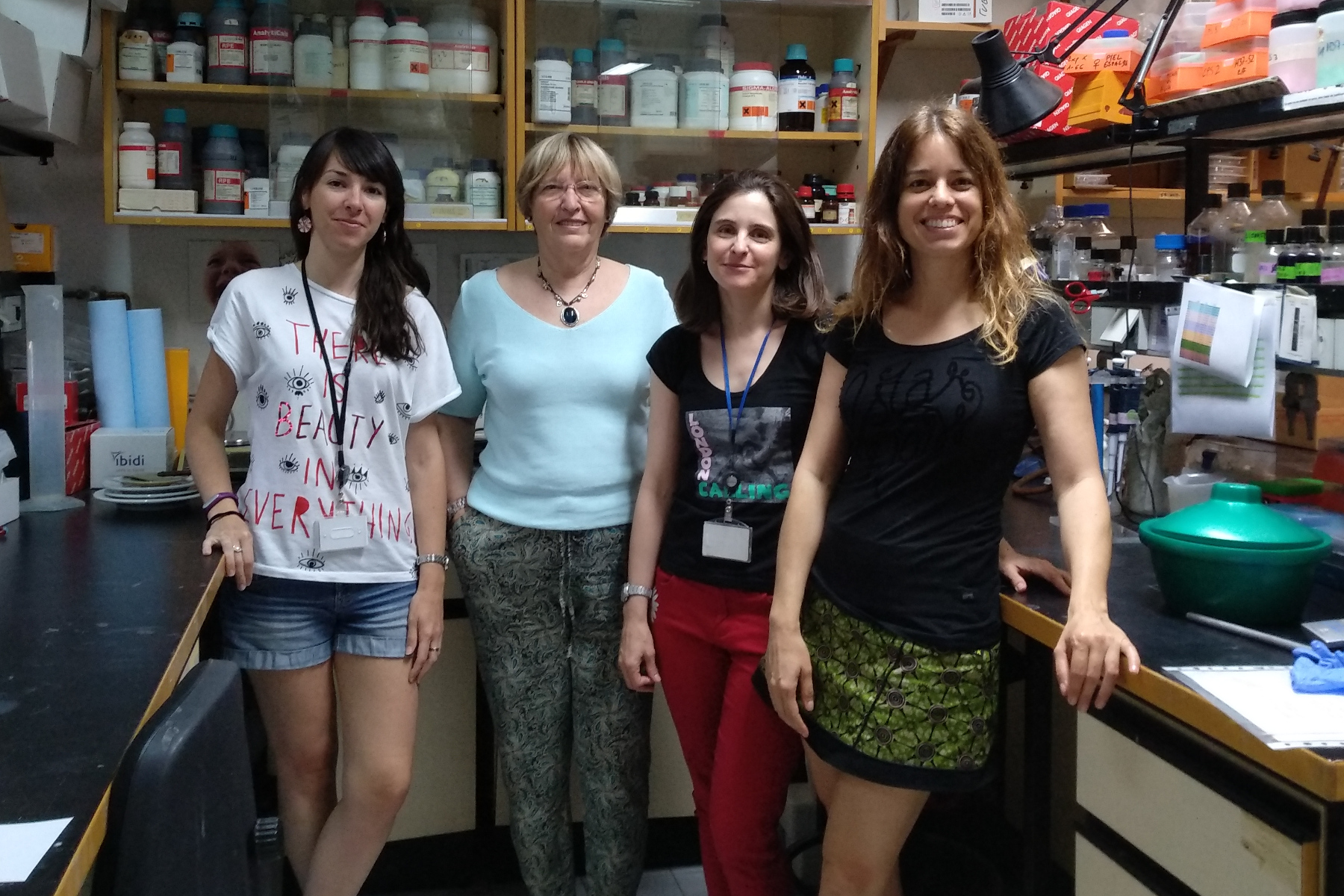Dc. Aranda Group
Pathophysiology of Thyroid Hormone Receptors
This group is part of the “Alberto Sols” Institute of Biomedical Research, a joint center of the National Research Council (CSIC) and the Autonomous University of Madrid. Its research activity focuses on the study of the molecular mechanisms by which nuclear receptors, particularly thyroid hormone receptors (TRs), affect several pathophysiological processes such as inflammation, tumorigenesis, and cellular reprogramming. Recent results from this group indicate that the NCoR (nuclear corepressor) is an important mediator of the antitumor and antimetastatic effects of TRs, and that these receptors inhibit the development of fibrotic processes.


About Us
- Principal Investigator:
Ana María Aranda - Doctoral Fellows:
Ana Montero Pedrazuela
Constanza Contreras Jurado
Irene López Mateo

What Do We Research?
Our group’s research activity focuses on the study of the molecular mechanisms by which nuclear receptors, particularly thyroid hormone receptors (TRs), affect several pathophysiological processes such as inflammation, tumor formation, and cellular reprogramming. Recent results from this group indicate that the NCoR (nuclear corepressor) is an important mediator of the antitumor and antimetastatic effects of thyroid hormone receptors, and that these receptors inhibit the development of fibrotic processes.
Thyroid hormone receptors work as molecular integrators of complex biological processes such as growth, development, metabolism, or tissue homeostasis. In our lab, we have proven that they are also involved in different pathological processes such as inflammation, cancer, and fibrosis. Therefore, it is essential to comprehend the molecular mechanisms by which these receptors regulate genic expression in order to influence these pathophysiological processes.
One of the main goals of this group is to better comprehend the mechanisms by which thyroid hormone receptors —and, more specifically, its β isoform (TRβ)— carry out actions as tumor suppressors, paying special attention to their effects on tumor stem cells.
This work is based on previous research by the lab, which has been working for over 30 years on the mechanism of action of thyroid hormones and other nuclear receptor ligands.
Our group has shown that TRβ inhibits tumor growth and the formation of metastasis, and that the NCoR corepressor, which associates with the receptor, plays a crucial role in this inhibition. From this lab, we are analyzing the genes, the epigenetic changes, and the molecular mechanisms responsible for these effects. At the same time, we are exploring the role of the receptor and the corepressor as malignity markers in hepatocellular carcinoma and breast cancer.
Since lymphangiogenesis plays an essential role in tumor dissemination and in the metastatic growth of mammary tumors, we are also analyzing the role of TRβ and NCoR in the expression of lymphangiogenic genes and in the formation of lymph vessels in breast cancer.
There is growing evidence that some of the actions of thyroid hormone receptors in tissue homeostasis are mediated by the regulation of stem cell and progenitor cell biology. Thus, in our lab, we have shown that these receptors play an important role in the function and mobilization of epidermal stem cells. Our previous experience has driven us to study the possibility that some of the receptor’s antitumor actions could result from the regulation of the number of tumor stem cells or from the regulation of their activity. One of the current hypotheses is that a small population of tumor-initiating cells that share some characteristics with cancer stem cells could be essential in the formation of metastasis and in the resistance to antitumor therapies. Therefore, one of our lines of work focuses on studying the role of the receptor and the corepressor as regulators of breast cancer stem cell biology. We analyze their effect on this type of cells and, more specifically, on their self-renewal, their invasive capacity, their capacity to form new tumors, their resistance to drugs, and the formation of mammospheres.
We think that the development of these lines of research is not only important in order to better comprehend the mechanisms of hormone action, but is also of biomedical interest. Both TRβ and NCoR could become new biomarkers and constitute a predictive factor of the evolution of certain tumors. Hopefully, in the long term, these studies can serve as the foundation for better patient treatment. Metastases are the main cause of death in cancer patients. Therefore, a profound knowledge of the genes and the molecular processes involved in metastatic growth is essential for the development of new therapeutic approaches to the treatment of tumors. The receptor and the corepressor are likely to become new therapeutic targets due to their effect on processes essential to tumor dissemination (such as tumor lymphangiogenesis) or on tumor stem cell biology (which can affect the tumor’s capacity to escape conventional therapies, resulting in cancer relapse)
Finally, cellular reprogramming, which is the generation of pluripotent stem cells from cells differentiated by specific transcription factors (the Yamanaka factors), is an essential tool for the study of cell homeostasis and for the development of potential therapeutic treatments for a great number of diseases. However, this method has serious efficiency and safety issues. Research shows that several molecules and some nuclear receptors facilitate cell reprogramming increasing its efficiency and even substituting some of the Yamanaka factors. Our results indicate that thyroid hormones increase the efficiency of the reprogramming of mouse fibroblasts. Thus, we find it is of great interest to explore the mechanisms by which thyroid hormone receptors can increase pluripotence, as well as to analyze the role the corepressor might possibly play in this process. We will study the possible epigenetic and gene expression changes produced by the receptor that could facilitate cell reprogramming.
The fact that a natural hormone essential to human health has this effect opens up the possibility of new studies that contribute to increasing the knowledge of the mode of action of nuclear receptors. These studies can shed light on the mechanisms responsible for somatic cell reprogramming into pluripotent stem cells, contributing to the development of regenerative medicine.
Publications
- Thyroid hormones inhibit TGFβ signaling and attenuate fibrotic responses.Alonso Merino E, Martín-Orozco R, Ruiz-LLorente L, Velasco-Martín J.P, Martínez-Iglesias 0, Montero-Pedrazuela A, Fanjul-Rodriguez L.F, Regadera J and Aranda.PNAS (2016).
- The Thyroid Hormone Receptors Inhibit Hepatic Interleukin-6 Signaling During Endotoxemia.Contreras-Jurado C, Alonso-Merino E, Saiz-Ladera C, Valiño AJ, Regadera J, Alemany S, Aranda A.Sci Rep. (2016). Aug 3;6:30990. doi: 10.1038/srep30990.
- Autoregulatory Loop of Nuclear Corepressor 1 Expression Controls Invasion, Tumor Growth and Metastasis.Martínez-Iglesias 0, Alonso Merino E, Gómez-Rey S, Velasco-Martín J.P, Martín-Orozco R, Luengo E, García-Martín R, IIbáñez-Cáceres I, Fernández A, Fraga M, González-Peramato P, Varona C, Palacios J, Regadera J and Aranda A.PNAS (2016). Jan 19;113(3):E328-37.
- Thyroid hormone signaling controls hair follicle stem cell function.Contreras-Jurado C, García-Serrano L, Lorz C , Paramio JM and Aranda A.Mol. Biol. Cell (2015). Apr 1;26(7):1263-72.
- The thyroid hormone receptor β induces DNA damage and premature senescence.Zambrano A, García-Carpizo V, Gallardo ME, Villamuera R, Gómez-Ferrería MA, Pascual A, Buisine N, Sachs LM, Garesse R, Aranda A.J Cell Biol (2014). 204:129-46.
- Characterization of functional domains in the thyroid hormone receptor β1 involved in the antagonism with the ras oncogene. Role of the corepressors SMRT and NCoR.García Silva S, Martínez-Iglesias O, Ruiz-Llorente L and Aranda A.Oncogene (2011). 17;30(7):854-64
- The thyroid hormone receptor β1 acts as a potent suppressor of tumor invasiveness and metastasis.Martínez-Iglesias, S. Garcia-Silva, St.P. Tenbaum, J.Regadera, F. Larcher, J. M. Paramio, B. Vennström and A. Aranda.Cancer Res (2009). 69:501-509.
- Vitamin D-dependent recruitment of corepressors to vitamin D /retinoid X receptor heterodimers.Sánchez R, Zambrano A, Castillo A.I , Aranda A.Mol. Cell (2008). 28:3817-29.
- The retinoid X receptor ligand restores defective signaling by the vitamin D receptor.Sánchez-Martínez, R., Castillo, A.I., Steinmeyer, A. and Aranda, A.EMBO Reports (2006). 1030-1034.
- The thyroid hormone receptor antagonizes CREB-mediated transcription.M.Méndez-Pertuz, A.Sanchez-Pacheco and A.Aranda.EMBO J (2003). 22: 3102-3112 (2003).




